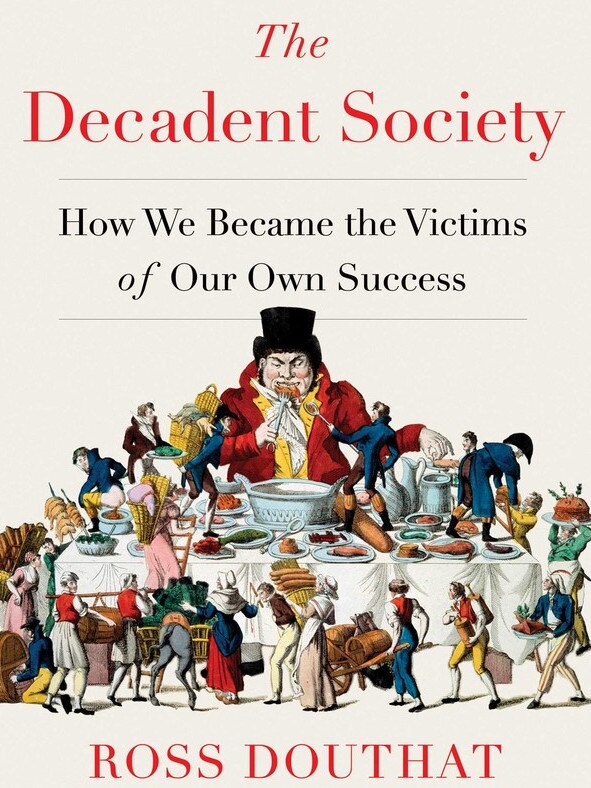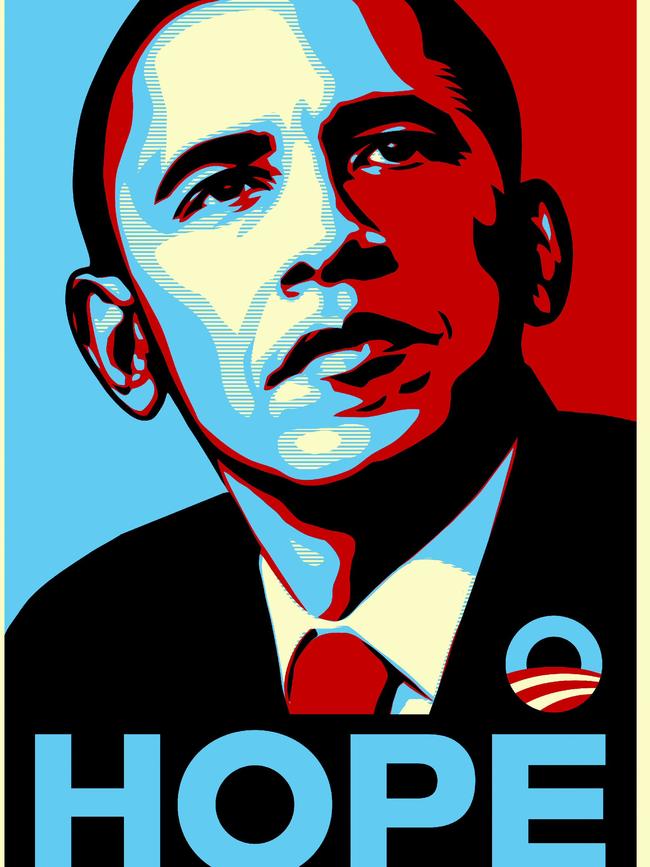Trump, Biden and Covid: all the fault of our decadent society
The failure of the Apollo moon landing to lead to an era of space exploration bookmarks the fatal waning of ambition in our culture. Trump, Biden and Covid are the result.

We are not standing on the cusp of decadence. The US, and Australia, have been decadent for half a century or more. The culture wars of the 1960s have never been resolved but have left us with a paralysed dystopia slowly getting worse. The failure of the Apollo moon landing to lead to an era of space exploration bookmarks the fatal waning of ambition in our culture. Technology has failed its promise. Politics has declined into permanent gridlock.
This challenging, invigorating, in many ways counterintuitive analysis of the West’s deep crisis comes in a brilliant book, The Decadent Society, by Ross Douthat, published earlier this year in the US and just now available in Australia.
Douthat is the most brilliant younger Catholic voice now writing. A social conservative and cultural critic, he is a columnist both for the left liberal New York Times and the great house journal of US conservatism, National Review. He writes from a non-sectarian, broadly Christian point of view. He is a trenchant critic of Trump and a trenchant critic of Trump’s foes, but he mainly interrogates culture as more important than politics.
Douthat’s bracing and original analysis does not offer a formula. By decadent he doesn’t mean Bacchanalian orgies and too much booze. Instead he defines decadence as, “economic stagnation, institutional decay, and cultural and intellectual exhaustion at a high level of material prosperity and technological development”.
He quotes the French cultural critic Jacques Barzun, who observed of decadence that it: “Sees no clear lines of advance. The forms of art as of life seem exhausted; the stages of development have been run through. Institutions function painfully. Repetition and frustration are the intolerable result. Boredom and fatigue are great historical forces … When people accept futility and the absurd as normal, the culture is decadent.”
Decadence is the loss of purpose and meaning.

One of Douthat’s most appealing qualities is that he sees the importance of how everything is connected. Many analysts, especially those proposing a new diagnosis or treatment for our ills, focus on one cause and one remedy, one mistake and one correction.
Douthat instead offers an impressionistic but still systematic interpretation of how the great trends of society are working together to produce the anomie and dislocation, the sterility and paralysis, of decadence.
He looks at the economy, technology, the arts, social functioning, the social effects of the internet, the effectiveness of institutions, the limits of political ambition, the limits of belief and, perhaps most important of all, fertility, or what he bluntly calls sterility.
He nonetheless gives decadence its due. The US, and the rest of the West, is historically affluent, and mostly not at war.
Yet across all the dynamics he analyses, he sees the creep of decadence. Western economic growth has basically stopped. He offers five structural limits on future Western economic growth: demographic decline, the overhang of debt, constraints on education, environmental limitations and technological stagnation.
Some of these factors seem surprising. Yet as it has got richer the US, and similar societies such as Australia, got worse at doing some basic things. Thus white literacy in the US peaked way back in the 1970s. For all the countless extra trillions of dollars poured into education, society is less likely to produce a child who can read and write today than it was 50 years ago.
He is fascinating on technological stagnation. If a regular person from 1890 was transported into a 1960s kitchen they would be staggered by the changes, the revolution in technology affecting everyday life. If a regular person from the 1960s was transported to today, they would find the kitchen much the same, with a few new gadgets. Mainly they would be perplexed by the inhabitants constantly fiddling with mobile phones.

Douthat is fascinating on technology. The one great technological innovation of our age is the internet; the digital universe. But this technology has not changed human life in the way that previous generations of technological advance did, the way the invention of railways and electricity and aeroplanes did.
He quotes this thought experiment. Imagine if you could keep every invention up to 2002, including your laptop and mobile phone, and you get to keep running water and an indoor toilet. As opposed to that you could keep everything invented since 2002 but lose running water and the indoor toilet. Everyone who is asked this question prefers to keep running water and the indoor toilet over all the modern wonders of the internet.
This is not to suggest the internet is not marvellous in its way, but it hasn’t transformed life, nor made the world wealthy, as earlier generations of technology did. All the science-fiction inventions of Star Trek and the Jetsons, all the promise of interplanetary travel and new eras of space colonisation, have all come to nothing. And so many inventions seem to be still just around the corner. Clean energy will the day after tomorrow be so affordable that it doesn’t need subsidies and will sweep the world, including the developing world, which needs cheap energy. Yet somehow it is always still going to come the day after tomorrow. The day after tomorrow has been waited on these many, many years.
The biggest effect of the digital world has been on our minds and personalities. Lately it has not even improved productivity much. But in entertainment and addiction it is supreme. It has had perverse effects on the human personality.
Douthat is famously a critic and opponent of pornography and has argued, in The New York Times, that it should be regulated and limited even on the net as it is dehumanising in every way. Yet the consequence of ubiquitous, industrial-scale pornography, as he argues in The Decadent Society, is not what conservatives initially expected. There is a small minority of men who are affected by pornography in a way that makes them more violent and more likely to become rapists.

But mostly, Douthat astonishingly finds, the effect has been tranquillising. Industrial-level porn has produced anomie, alienation, satiety, depression. Younger people are linking up and forming long term partnerships, whether marriages or stable de facto relationships, less than ever before. And they are having less sex. The sexual revolution of the 1960s, and the accompanying spread of porn, has apparently resulted in less sex and fewer marriages.
And it is one of the factors contributing to very low birth rates. Meanwhile, the deaths of despair — suicides, social isolation, opioid overdoses, alcoholism and morbid obesity — have been on the rise. Young people today are the most medicated generation in human history. And disproportionately they are alone and unhappy. In 2018 the highest proportion ever of prime-age American males — 11 per cent — were not in the work force, not deriving the self-respect that comes from systematic, gainful employment. And of course not becoming very attractive marriage partners.
The decline in the Western birthrate is staggering. For a long time the US birthrate was higher than in almost any other Western nation. But it has collapsed in recent years, The only Western nation that still has a replacement level or above birthrate is Israel.
Douthat’s international comparisons are fascinating. Japan was for a long time reported by Western media as just weird, but Douthat thinks it is the trailblazer for Western societies. It has become uniquely sexless with a record low birth rate. The old family life that defined Japan has disappeared as children have disappeared and it is now embarked on a serious and accelerating absolute population decline. Yet it has remained orderly, peaceful and affluent, illustrating, in Douthat’s terms, the potential durability of decadence.

Israel, on the other hand, is the one Western nation that is not decadent, because it is still fired by a nation-building and people-building project and strives mightily to make the impossible not only possible but real.
A distinctive element of Douthat’s analysis is that we have been inhabiting our civilisational decadence now for 50 years. In one respect I can confirm Douthat’s proposition. I was an undergraduate at Sydney University in the mid 1970s, 45 years ago. At our greatest university, the courses I enrolled in were almost uniformly junk. A lecturer in human geography informed our class that Chairman Mao was the greatest practitioner of human geography, synthesising practice and theory. But wait a minute, I objected, his policies killed tens of millions of innocent people. In the economics department there was a choice between Marxism, in political economy, while the traditional discipline had taken refuge in mathematics, in quantitative methods. The philosophy department was divided between a traditional sub-department versus a Marxist sub-department. In other words, every piece of postmodern junk, all the academic insanity, and all the conservative critiques of it, were all there nearly 50 years ago. As Douthat observes, it’s 50 years since postmodernism, and the conservative critique of postmodernism, have been new.
So although our society seems to be full of change, because it is ratty and unhappy, it is really just endlessly recycling hugely sterile set positions.
But decadence won’t last forever. It can collapse or be replaced internally, or the decadent society can be destroyed by a more vigorous external enemy, or by some external challenge, a plague or an environmental collapse, which it cannot deal with.

Trump’s election, Douthat argues, was a populist revolt against decadence. But Trump, in Douthat’s view, is at least as fraudulent as the national decadence he attacks. He is most extreme, most opposed to the temper of his times, in his Twitter emanations. His actual presidency has been mostly tax cuts and routine gridlock.
And then, Douthat argues, populists are typically not very good at government. But this is not especially a partisan point from Douthat. Barack Obama, as much as Trump, offered an alternative to the endless repetitive ineffectiveness of decadence, in his soaring oratory about neither red America nor blue America, but the United States of America. But his presidency too was gridlock, accompanied by incremental increases in health insurance coverage.
Douthat is the most civilised and rhetorically temperate of writers, but his judgment on the hollowness of the two political tribes at war in the US is scathing: “ … a defence of the West’s historical Christian and European character that reduces that civilisation to a #MAGA bunker; a preservationist project steeped in nostalgia for the dynamism of the past. On the other side, a vision of a civilisation with no common memory, no religious roots, no distinctives beyond its political procedures, and no self-awareness about its establishment’s vaulting arrogance and historical illiteracy. A conservatism with no vision of how to revitalise itself and, therefore, no defence except the wall, the moat, the rampart. A liberalism that doesn’t recognise how little it satisfies the human heart; how vulnerable it would be to real challenges if ever they arose.”
Decadence can last for a long time. The Roman empire, as WH Auden remarked, “managed to last for four centuries without creativity, warmth or hope”. But it won’t last forever. Douthat forecasts several ways in which it could end in catastrophe, and a few ways in which it could be transformed through renaissance, the most likely of which would be a renaissance in religious belief.
But don’t hold your breath.




The United States, and the West, are caught in the slowly asphyxiating grip of a decadence they do not understand, and have been there for 50 years. Donald Trump is the sort of president a decadent society gives you, (as, in my view, would be Joe Biden). And the failures of national US institutions, like the Centres for Disease Control, to respond with even elementary competence in dealing with the COVID-19 pandemic is a sign of the enervated, anaemic quality of so many state and private institutions in the age of decadence, even in the richest society in the world.